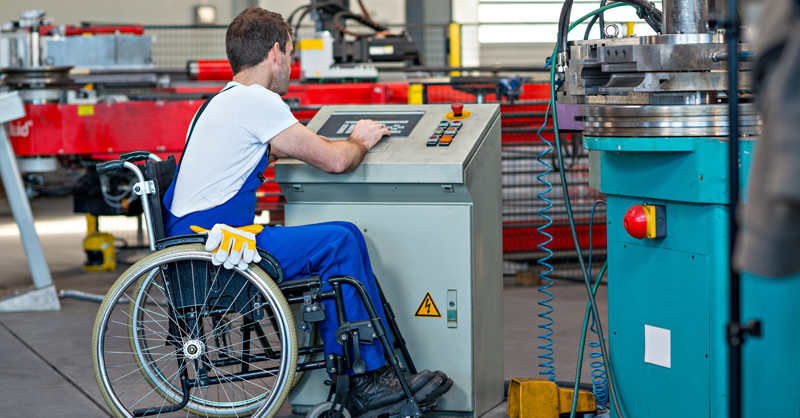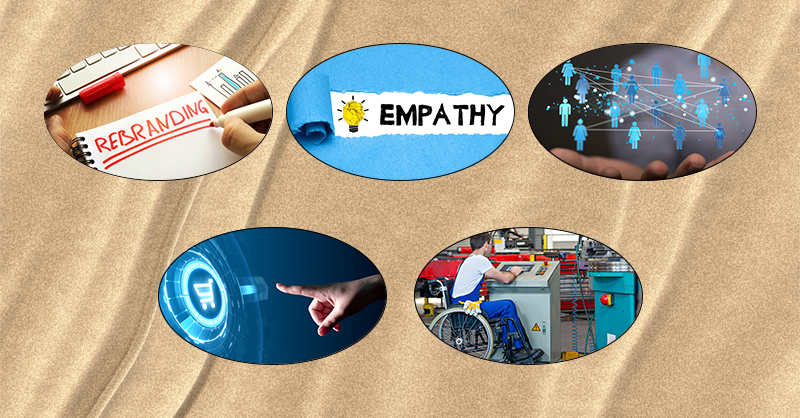Following on from our successful Sandpit event at Loughborough University, InterAct has funded five projects examining a range of topics concerning the manufacturing sector.
Developing a strategy that will shape the rebranding of UK digital manufacturing

Vitalii Vodolazskyi / Adobe Stock
Principal Investigator:
Dr. Karl Warner – University of Glasgow
Co-investigators:
Dr. Nicola Bailey – King’s College London
Dr. Imtiaz Khan – Cardiff Metropolitan University
Dr. Anna Chatzimichali – University of Bath
Malek El-Qallali – University of Bath
Dr. Anastasia Kulichyova – Queens University Belfast
Project Outline:
This project aims to highlight the most probable future scenarios for rebranding manufacturing that can help stakeholders attract the next generation of young talent towards a career in UK digital manufacturing by 2040. This is rooted in the ambition of making the future of the sector a place that attracts, includes, and supports young talent from diverse backgrounds and mindsets.
Recent research conducted by Make UK – a UK manufacturers’ association – found that only 2% of the average UK manufacturing workforce is below 30 years old. These statistics are concerning considering current labour market inactivity rates and the shrinking UK population.
These statistics have triggered further research, including a large-scale InterAct Perceptions of Manufacturing survey that investigated UK public perceptions of the manufacturing industry and its place of work. Based on UK-wide survey of 2,000 people, a powerful message coming out of the results is that younger generations identify UK manufacturing as a less desirable brand, with many people being primarily uncertain about manufacturing employment prospects.
Using a variety of innovative methods to gather insights on potential rebranding opportunities from employers, educators, industry experts, policymakers and young people, this project intends to co-create the most probable future scenarios that can help stakeholders attract the next generation of young talent. This will enable the creation of a cross-generational map of peoples’ experiences of UK manufacturing – both past and present – that visualises potential opportunities for attracting the next generation of young talent towards a career in UK digital manufacturing.
Informing empathy-led change management: Creating a measurable readiness health plan for the adoption of digital technologies in manufacturing

magele-picture / Adobe Stock
Principal Investigator:
Dr. Mersha Aftab – Birmingham City University
Co-investigators:
Dr. Mey Goh – Loughborough University
Dr. Iryna Yevseyeva – De Montfort University
Project Outline:
The project aims to improve the success of technology adoption in manufacturing organisations using an empathy-led approach to create a measurable readiness health plan for change management.
Whilst the value of digital technologies is well accepted, the UK is not adopting these technologies as quickly as our competitors. The Made Smarter Innovation People-Led Digitalisation (PLD) Centre has identified this as a challenge. They note that digitalisation tools are abundantly available and advancing at pace, but adoption rates could be higher, and it is not always clear what values these tools bring to an individual worker.
When trying to infer the adoption of technology by a person, it is important to consider what values they attach to the use of that technology. The difficulty is that most values are intrinsic, tacit, and non-transferable.
The Empathy-Led Change Management team aims to develop an initial version of a digital toolkit for businesses. This toolkit will be able to map and demonstrate the readiness level of the workforce in a company in real time. It will also support management to introduce the right strategies of people-led change at the right point of readiness, so the adoption is bespoke and ‘made to measure’.
Manufacturing a better future – exploring inclusive digital manufacturing

Firma V / Adobe Stock
Principal Investigator:
Dr. Marisa Smith – University of Strathclyde
Co-investigators:
Professor Nigel Caldwell – London Metropolitan University
Dr. Eun Sun Godwin – University of Wolverhampton
Dr. John Oyekan – University of York
Dr. Sebastian Pattinson – University of Cambridge
Project Outline:
This project is investigating how the use of digital tools can enable a more inclusive workforce in manufacturing. They will be focusing specifically on demonstrating how to engage disabled people to participate in digital design processes. The outcomes will include insight into removing barriers to entry for currently excluded groups to the manufacturing workforce.
The current focus in manufacturing policy and practice on equality and diversity has been limited to gender and ethnic diversity. Although according to Scope almost a quarter (23%) of the UK working age population are disabled, the industry has lacked a real interest in the inclusion of disabled people.
The employment gap between disabled and non-disabled people has also remained consistently high, at around 30% for the past 10 years, with a pay gap of almost 20% for disabled workers compared with non-disabled workers according to the Together Trust.
In order to counteract and overcome these challenges, the overall objectives of the project are:
- To collaborate disabled people to understand how they can participate in digitalisation and manufacturing:
- To gain a first-hand account of disabled people on manufacturing and working within the manufacturing ecosystem.
- To understand technology developers’ expert view on technical constraints and adjustments with current digital technologies that need to be considered for accessibility of disabled people.
- To explore how disabled people interact with AI interfaces and examine how the technology can be adapted to address any design challenges.
- To build on the current InterAct 2040 scenarios by providing additional scenarios on inclusive manufacturing embracing disabled people through inclusive digital solutions.
- To show small manufacturing non-adopters of digital tools the benefits and relative ease of adopting inclusive digital tools.
The project will provide greater understanding of how the digital divide, as well as the disability employment gap, can be narrowed through the inclusion of disabled people into the manufacturing ecosystem.
Community co-created distributed manufacturing platform (COCODISMAN)

vegefox.com / Adobe Stock
Principal Investigator:
Dr. Elaine Conway – Loughborough University
Co-investigators:
Atanu Chaudhuri – Durham University
Dr. Usman Adeel – Teesside University
Jay Daniel – University of Derby
Project Outline:
The aim of this project is to develop a blueprint for a co-created, distributed, community-based manufacturing platform in the UK with a business model to support its financial viability and scalability.
In many UK communities, there is apathy towards manufacturing, a digital skills divide, unemployment challenges and low engagement with disadvantaged or hard to reach groups. Equally, local manufacturers need to adopt digital technologies to remain competitive but face severe skills shortages.
Recognising these issues, the team behind COCODISMAN will be carrying out a scoping exercise to discover what community needs exist for digital skilling and local manufacturing. Using this information, they will create a digital platform which matches the needs with deliverables as they currently exist in the community. The ultimate aim of this process is to provide the link between community needs for products and skills and local manufacturing facilities with excess capacity.
The project objectives are to:
- Understand the challenges which local communities face in getting objects repaired and delivered at reasonable cost, their perceptions about manufacturing as a career choice and acquiring the necessary skills to gain employment in the manufacturing sector.
- Understand the challenges faced by local manufacturers in upskilling their employees while embracing digital transformation and in attracting a future workforce to manufacturing.
- Understand the challenges faced by local councils in creating meaningful learning and employment opportunities for young people to enter the manufacturing sector and in supporting the elderly population in accessing manufactured goods and services.
- Assess the potential of a digital platform in changing the perception of the community towards manufacturing, improving skills, reducing the digital divide and improving youth engagement in manufacturing.
- Support sustainable and localized production.
The COCODISMAN platform developed and rolled out at the end of the project will form the basis for greater collaboration by the researchers involved with partners such as local county councils, local manufacturers, and industry representative organisations.
The role of consumers in driving UK manufacturing’s digital transformation

MyCreative / Adobe Stock
Principal Investigator:
Professor Ana Isabel Canhoto – University of Sussex
Co-investigators:
Dr. Maren Schneider – Anglia Ruskin University
Dr. Ahmed Beltagui – Aston University
Ramin Behbehani – Brunel University London
Niraj Kumar – University of Essex
Project Outline:
The aim of this research is to identify the factors that lead consumers to adopt new Everything as a Service (XaaS) models of consumption, and drive the adoption of digitally enabled, distributed models of manufacturing.
XaaS is a business model for consumers to pay for access to a product’s benefits rather than own it outright. XaaS may take the form of acquiring a product whose performance is remotely monitored by the manufacturer. Parts are replaced or instructions issued to the consumer, as needed, through a maintenance contract, to extend the useful life of the product, a XaaS ‘stewardship-model’.
Alternatively, XaaS may take the form of acquisition of a service, with the manufacturer owing the machine and monitoring its maintenance needs, remotely, intervening when needed to ensure continued provision of the service, a XaaS ‘usership-model’ of consumption.
There are numerous benefits to XaaS including reducing manufacturers’ incentives to make products obsolete in order to generate additional sales, reducing electronic waste, increasing consumer retention, increasing consumers’ access to the latest technology, improving the energy efficiency of household appliances.
The project will attempt to achieve the following objectives:
- Analyse viable XaaS models for washing machines.
- Identify the factors influencing consumers’ acceptance of XaaS for washing machines.
- Test the impact of those key factors in driving demand for washing machines under the stewardship vs. usership models.
- Develop recommendations to support the development and implementation of XaaS in UK manufacturing.
If you’re interested in getting involved with any of these projects, you can contact the project team or email us at info@interact-hub.org.

